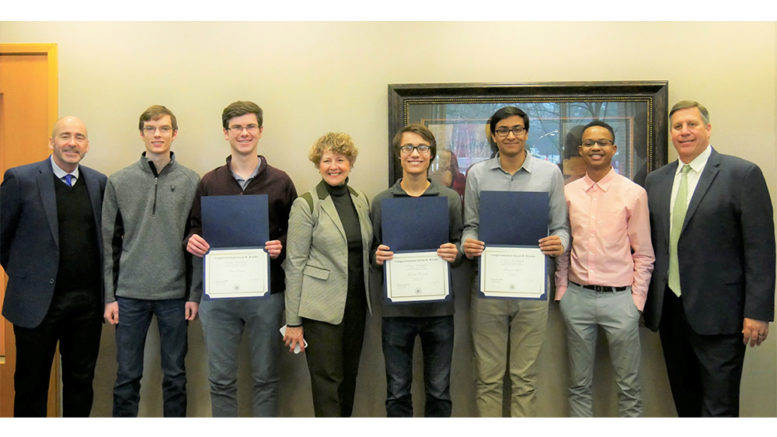A group of three Carmel High School seniors have won this year’s Congressional App Challenge (CAC) for the development and implementation of their digital hall pass app, “PassMaster.” Congresswoman Susan Brooks (R-Ind.-05) visited Carmel High School Monday morning to announce the winners.
Evan Kenyon, Joseph Paavola and Armaan Goel won the competition. They were assisted by fellow students Jared Stigter and Andrew Sleugh. Their app will be on display in the U.S. Capitol Building in Washington, D.C. Click here to watch a short video about PassMaster.
The CAC is a competition designed to engage students from across the country in computer science and coding. More than ever before, Science, Technology, Engineering and Math (STEM) skills, including computer science, are vital to compete in the workforce, to build a culture of innovation and to spur economic growth. The competition is intended to promote student engagement in STEM fields and to encourage them to pursue skills that will serve them throughout their careers.
Students in middle or high school are encouraged to compete by creating and exhibiting an app for mobile, tablet, or computer devices on a platform of their choice. An expert panel of judges evaluated each submission based on the following criteria: Quality of the idea, implementation of the idea and demonstrated excellence of coding and programming skills. Click here for more information.
When the group of students submitted the final version of their app for review, they provided these answers to the following questions:
- What Coding languages did you use to complete your app?
Python, HTML, CSS, DART, and the Bootstrap, Flutter and Django frameworks.
- What inspired you to create this app?
We met with our school’s administration and discussed the way passes worked. We found that the current pass system was disorganized and lacked accountability, and PassMaster will solve these issues.
- What is your app trying to accomplish?
Our app attempts to fix our school’s pass system. It does so by allowing teachers and students to request, approve and create passes wherever they are and whenever they need.
- What’s a technical difficulty you faced in programming your app, and what technical solution did you use to overcome it?
One of the biggest challenges we faced when we created PassMaster was making sure that it was built with both teachers and students in mind, two totally separate demographics. In order to make sure that it was accessible and useful to each group, we made it available in both web and mobile app formats and added features tailored to each group that the old paper pass system couldn’t have supported. Making it available on computers via a web browser as well as in mobile app form lets each group use it in the way that best suits them. However, to make sure that teachers and students could use PassMaster regardless of their personal preferences, we made sure everyone could use either interface. One feature we added to aid in this accessibility was letting students write their own passes and then ask teachers to approve it, something that wasn’t possible with our school’s old pass system. For teachers, we added a list of students who were incoming so that they would know how many students were coming and which ones were coming in most often, a highly requested feature that was lacking from the paper pass system. However, this increase in accessibility meant we had to essentially design two separate interfaces that were both integrated and had a similar look and feel. Adding this on top of making both web and app interfaces meant we had to do a lot more work than we could have if we had decided not to build the project for with both teachers and students in mind.

